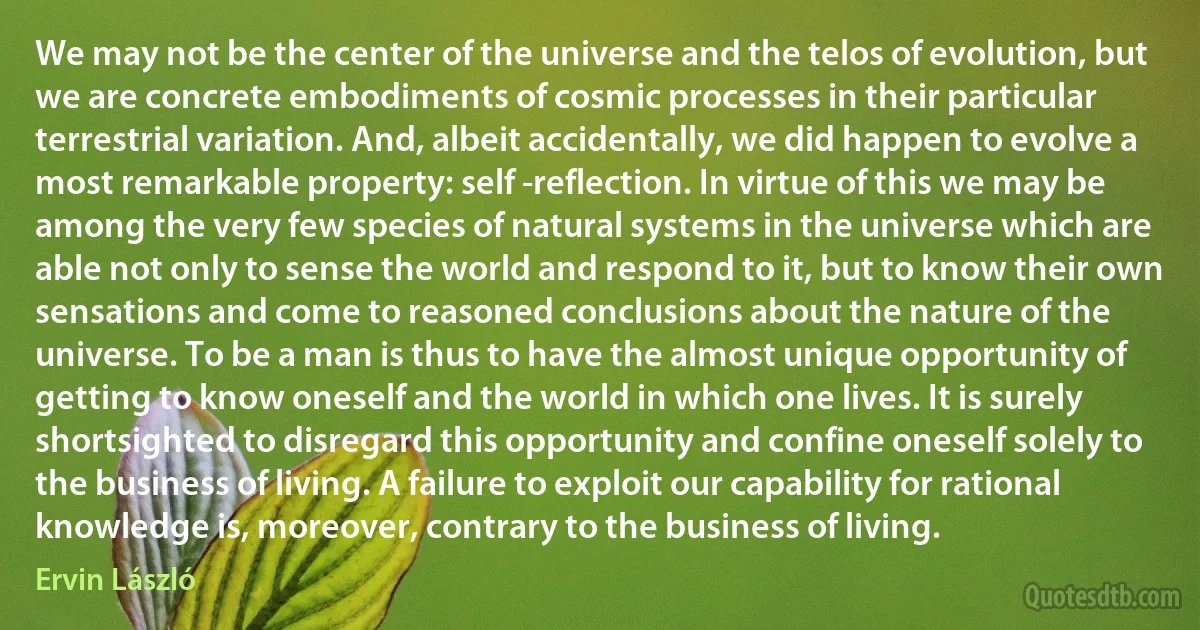
We may not be the center of the universe and the telos of evolution, but we are concrete embodiments of cosmic processes in their particular terrestrial variation. And, albeit accidentally, we did happen to evolve a most remarkable property: self -reflection. In virtue of this we may be among the very few species of natural systems in the universe which are able not only to sense the world and respond to it, but to know their own sensations and come to reasoned conclusions about the nature of the universe. To be a man is thus to have the almost unique opportunity of getting to know oneself and the world in which one lives. It is surely shortsighted to disregard this opportunity and confine oneself solely to the business of living. A failure to exploit our capability for rational knowledge is, moreover, contrary to the business of living.
Ervin LászlóRelated topics
able almost business concrete evolution failure few getting knowledge lives living man natural nature opportunity property reflection self sense terrestrial thus unique variation virtue world telosRelated quotes
In reviewing the several levels of life which morality defines, we may observe two types of universal value. The lower values m relation to the higher are indispensable. There is no health without satisfaction, no achievement without health, no rational intercourse without achievement, and no true religion except as the perfecting and completing of a rational society. The higher values, on the other hand, are more universal than the lower in that they surpass these in validity, and are entitled to preference. Thus the lower values are ennobled by the higher, while the higher are given body and meaning by the lower. Satisfaction derives dignity from being controlled by the motive of good-will, while the moral kingdom at large derives its wealth, its pertinence to life, and its incentive, from the great manifold of particular interests which it conserves and fosters.

Ralph Barton Perry
The specialist serves as a striking concrete example of the species, making clear to us the radical nature of the novelty. For, previously, men could be divided simply into the learned and the ignorant, those more or less the one, and those more or less the other. But your specialist cannot be brought in under either of these two categories. He is not learned, for he is formally ignorant of all that does not enter into his speciality; but neither is he ignorant, because he is "a scientist," and "knows" very well his own tiny portion of the universe. We shall have to say that he is a learned ignoramus, which is a very serious matter, as it implies that he is a person who is ignorant, not in the fashion of the ignorant man, but with an the petulance of one who is learned in his own special line.

José Ortega y Gasset
But, as we consider the totality of similarly broad and fundamental aspects of life, we cannot defend division by two as a natural principle of objective order. Indeed, the "stuff” of the universe often strikes our senses as complex and shaded continua, admittedly with faster and slower moments, and bigger and smaller steps, along the way. Nature does not dictate dualities, trinities, quarterings, or any "objective” basis for human taxonomies; most of our chosen schemes, and our designated numbers of categories, record human choices from a cornucopia of possibilities offered by natural variation from place to place, and permitted by the flexibility of our mental capacities. How many seasons (if we wish to divide by seasons at all) does a year contain? How many stages shall we recognize in a human life?

Stephen Jay Gould
Those who say that all historical accounts are ideological constructs (which is one version of the idea that there is really no historical truth) rely on some story which must itself claim historical truth. They show that supposedly "objective" historians have tendentiously told their stories from some particular perspective; they describe, for example, the biasses that have gone into constructing various histories of the United States. Such an account, as a particular piece of history, may very well be true, but truth is a virtue that is embarrassingly unhelpful to a critic who wants not just to unmask past historians of America but to tell us that at the end of the line there is no historical truth. It is remarkable how complacent some "deconstructive" histories are about the status of the history that they deploy themselves.

Bernard Williams
I left Symons's company newly aware of the unthinking cruelty discreetly coiled within the magnanimous bourgeois assurance that everyone can discover happiness through work and love. It isn't that these two entities are invariably incapable of delivering fulfilment, only that they almost never do so. And when an exception is represented as a rule, our individual misfortunes, instead of seeming to us quasi-inevitable aspects of life, will weigh down on us like particular curses. In denying the natural place reserved for longing and error in the human lot, the bourgeois ideology denies us the possibility of collective consolation for our fractious marriages and our unexploited ambitions, and condemns us instead to solitary feelings of shame and persecution for having stubbornly failed to become who we are.

Alain de Botton
